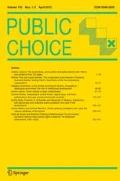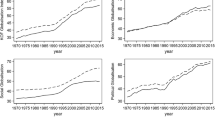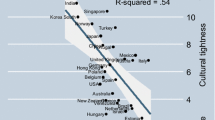Abstract
How do economic freedom and culture impact economic growth? This paper argues that culture, as measured by the World Values Surveys, and economic institutions associated with economic freedom are both independently important for economic prosperity, but the strength of their impact can be better understood only when both are included in the growth regression. Our results indicate that economic freedom is more important than culture for growth outcomes, suggesting substitutability between the two. We posit that culture is important for growth when economic freedom is absent, diminishing in significance once economic freedom is established.
Similar content being viewed by others
References
Aghion, P., Algan, Y., Cahuc, P., & Shleifer, A. (2009). Regulations and distrust. NBER Working Paper 14648. National Bureau of Economic Research, Cambridge, MA.
Banfield, E. C. (1958). The moral basis of a backward society. New York: Free Press.
Barro, R. J. (2001). Education and economic growth. In J. F. Helliwell (Ed.), The contribution of human and social capital to sustained economic growth and well-being. International Symposium Report: OECD and HRDC.
Barro, R. J. (2002). Education as a determinant of economic growth. In E. P. Lazear (Ed.), Education in the twenty-first century (pp. 9–24). Stanford: Hoover Institution Press.
Barro, R. J., & McCleary, R. (2003). Religion and economic growth across countries. American Sociological Review, 68(5), 760–781.
Bengoa, M., & Sanchez-Robles, B. (2003). Foreign direct investment, economic freedom and growth: new evidence from Latin America. European Journal of Political Economy, 19, 529–545.
Benson, B. L. (1989a). Enforcement of private property rights in primitive societies: law without government. The Journal of Libertarian Studies, 9(1), 1–26.
Benson, B. L. (1989b). The spontaneous evolution of commercial law. Southern Economic Journal, 55(3), 644–661.
Berggren, N. (2003). The benefits of economic freedom: a survey. The Independent Review, 8(2), 193–211.
Berggren, N., & Jordahl, H. (2005). Does free trade really reduce growth? further testing using the economic freedom index. Public Choice, 122(1–2), 99–114.
Berggren, N., & Jordahl, H. (2006). Free to trust: economic freedom and social capital. Kyklos, 59(2), 141–169.
Berggren, N., Elinder, M., & Jordahl, H. (2008). Trust and growth: a shaky relationship. Empirical Economics, 35, 251–274.
Beugelsdijk, S., de Groot, H. L. F., & van Schaik, A. B. T. M. (2004). Trust and economic growth: a robustness analysis. Oxford Economic Papers, 56, 118–134.
Bjørnskov, C. (2007). Economic growth: a social capital survey. In G. Svendsen, & G. Svendsen (Eds.), Handbook of Social Capital. Cheltenham: Edward Elgar.
Bjørnskov, C. (2009). How does social trust affect economic growth? Aarhus Economics Working Paper, No. 06-2.
Bjørnskov, C. (2010). How does social trust lead to better governance? An attempt to separate electoral and bureaucratic mechanisms. Public Choice, 144(1–2), 323–346.
Boettke, P. J. (2009). Review of Eric L. Jones cultures merging: a historical and economic critique of culture. Economic Development and Cultural Change, 57(2), 434–437.
Boettke, P., Coyne, C. J., & Leeson, P. T. (2008). Institutional Stickiness and the New Development Economics. American Journal of Economics and Sociology, 67(2), 331–358.
Bound, J., Jaeger, D. A., & Baker, R. M. (1995). Problems with instrumental variables estimation when the correlation between the instruments and the endogenous explanatory variable is weak. Journal of the American Statistical Association, 90(430), 443–450.
Carlsson, F., & Lundström, S. (2002). Economic freedom and growth: decomposing the effects. Public Choice, 112, 335–344.
Chamlee-Wright, E. (1997). The cultural foundations of economic development: urban female entrepreneurship in Ghana. New York: Routledge.
Dawson, J. W. (1998). Institutions, investment, and growth: new cross-country and panel data evidence. Economic Inquiry, 36, 603–619.
Dawson, J. W. (2003). Causality in the freedom-growth relationship. European Journal of Political Economy, 19(3), 479–495.
De Haan, J., Lundström, S., & Sturm, J. (2006). Market-oriented institutions and policies and economic growth: a critical survey. Journal of Economic Surveys, 20(2), 157–191.
De Haan, J., & Sturm, J. (2000). On the relationship between economic freedom and economic growth. European Journal of Political Economy, 16, 215–241.
Diamond, J. (1997). Guns, germs, and steel. New York: Norton.
Djankov, S., La Porta, R., Lopez-de-Silanes, F., & Shleifer, A. (2003). Courts. Quarterly Journal of Economics, 118(2), 453–517.
Duffy, D., & Stubben, J. (1998). An assessment of native American economic development: putting culture and sovereignty back in the models. Studies in Comparative International Development, 32(4), 52–78.
Francois, P., & Zabojnik, J. (2005). Trust, social capital and economic development. Journal of European Economic Association, 3(1), 51–94.
Fukuyama, F. (1996). Trust: the social virtues and the creation of prosperity. New York: Simon and Schuster.
Gallup, J., Sachs, J., & Mellinger, A. (1999). Geography and economic development. International Region Science Review, 22(2), 179–232.
Glaeser, E. L., La Porta, R., Lopeez-De-Silanes, F., & Shleifer, A. (2004). Do institutions cause growth? Journal of Economic Growth, 9, 271–303.
Greif, A. (1993). Contract enforceability and economic institutions in early trade: the Maghribi traders’ coalition. The American Economic Review, 83(3), 525–548.
Greif, A. (1994). Cultural beliefs and the organization of society: A historical and theoretical reflection on collectivist and individualist societies. Journal of Political Economy, 102(5), 912–950.
Greif, A., Milgrom, P., & Weingast, B. R. (1994). Coordination, commitment, and enforcement: the case of the merchant guild. The Journal of Political Economy, 102(4), 745–776.
Grier, R. (1997). The effect of religion on economic development: a cross-national study of sixty-three former colonies. Kyklos, 50(1), 47–62.
Guiso, L., Sapienza, P., & Zingales, L. (2006). Does culture affect economic outcomes? Journal of Economic Perspectives, 20(2), 23–48.
Gwartney, J. D., Lawson, R. A., & Block, W. (1996). Economic freedom of the world: 1975–1995. Vancouver: The Fraser Institute.
Gwartney, J. D., Lawson, R. A., & Holcombe, R. G. (1999). Economic freedom and the environment for economic growth. Journal of Institutional and Theoretical Economics, 155, 643–663.
Gwartney, J. D., Holcombe, R. A., & Lawson, R. G. (2004). Economic freedom, institutional quality, and cross-country differences in income and growth. Cato Journal, 24(3), 205–233.
Gwartney, J. D., Lawson, R. A., & Norton, S. (2008). Economic freedom of the world: 2008 annual report. Vancouver, BC: The Fraser Institute. Data retrieved from www.freetheworld.com.
Harper, D. A. (2003). Foundations of entrepreneurship and economic development. New York: Routledge.
Heinemann, F., & Tanz, B. (2008). The impact of trust on reforms. Journal of Economic Policy Reform, 11, 173–185.
Heston, A., Summers, R., & Aten, B. (2006). Penn world table version 6.2. Center for International Comparisons of Production, Income and Prices at the University of Pennsylvania.
Knack, S., & Keefer, P. (1995). Institutions and economic performance: cross country tests using alternative institutional measures. Economics and Politics, 7(3), 207–228.
Knack, S., & Keefer, P. (1997). Does social capital have an economic payoff? The Quarterly Journal of Economics, 112(4), 1251–1288.
Landa, J. T. (1994). Trust, ethnicity, and identity: The new institutional economics of ethnic trading networks, contract law, and gift-exchange. Ann Arbor: University of Michigan Press.
La Porta, R., Lopez-de-Silanes, F., Shleifer, A., & Vishny, R. (1997). Trust in large Organizations. American Economic Review, 87(2), 333–338.
La Porta, R., Lopez-de-Silanes, F., Shleifer, A., & Vishny, R. (1999). The quality of government. Journal of Law, Economics and Organization, 15(1), 222–279.
La Porta, R., Lopez-de-Silanes, F., Pop-Eleches, C., & Shleifer, A. (2004). Judicial checks and Balances. Journal of Political Economy, 112(2), 445–470.
Leeson, P. T. (2007a). Better off stateless: Somalia before and after government collapse. Journal of Comparative Economics, 35(4), 689–710.
Leeson, P. T. (2007b). Trading with bandits. Journal of Law and Economics, 50(2), 303–321.
Leeson, P. T. (2007c). Efficient anarchy. Public Choice, 130(1–2), 41–53.
Leeson, P. T. (2008). Social distance and self-enforcing exchange. Journal of Legal Studies, 37(1), 161–188.
Levine, R., & Renelt, D. (1992). A sensitivity analysis of cross-country growth regressions. American Economic Review, 82, 942–963.
Licht, A. N., Chanan, G., & Schwartz, S. H. (2007). Culture rules: the foundations of the rule of law and other norms of governance. Journal of Comparative Economics, 35, 659–688.
Mankiw, N. G., Romer, D., & Weil, D. (1992). A contribution to the empirics of economic Growth. The Quarterly Journal of Economics, 107, 407–437.
North, D. C. (1990). Institutions, institutional change, and economic performance. Massachusetts: Cambridge University Press.
North, D. C. (2005). Understanding the process of economic change. New Jersey: Princeton University Press.
Ostrom, E. (1990). Governing the commons: the evolution of institutions for collective action. New York: Cambridge University Press.
Patterson, O. (2000). Taking culture seriously: a framework and an afro-American illustration. In L. Harrison, & S. Huntington (Eds.), Culture matters: how values shape human progress (pp. 202–218). New York: Basic Books.
Pejovich, S. (2003). Understanding the transaction costs of transition: it’s the culture, stupid. The Review of Austrian Economics, 16(4), 347–361.
Platteau, J. (2000). Institutions, social norms, and economic development. Harwood: Academic Publishers/Routledge.
Porter, M. E. (2000). Attitudes, values, and beliefs, and the microeconomics of prosperity. In L. Harrison, & S. Huntington (Eds.), Culture matters: how values shape human progress (pp. 202–218). New York: Basic Books.
Putnam, R. D. (1993). Making democracy work: civic traditions in modern Italy. Princeton: Princeton University Press.
Sachs, J. (2001). Tropical underdevelopment. National Bureau of Economic Research Working Paper No. 8119.
Sachs, J. (2003). Institutions don’t rule: direct effects of geography on per capita income. National Bureau of Economic Research Working Paper No. 9490.
Tabellini, G. (2008). Presidential address: institutions and culture. Journal of the European Economic Association, 6(2–3), 255–294.
Tabellini, G. (2008b). The scope of cooperation: values and incentives. The Quarterly Journal of Economics, 123(3), 905–950.
Tabellini, G. (2009). Culture and institutions: economic development in the regions of Europe. Journal of the European Economic Association (forthcoming).
The European Values Study Foundation and World Values Survey Association (EVSF-WVSA) (2006). European and World Values Surveys Four-Wave Integrated Data File, 1981–2004, v.20060423.
Weede, E., & Kämpf, S. (2002). The impact of intelligence and institutional improvements on economic growth. Kyklos, 55, 361–380.
Weede, E. (2006). Economic freedom and development: new calculations and interpretations. Cato Journal, 26(3), 511–524.
Williamson, C. R. (2009). Informal institutions rule: institutional arrangements and economic performance. Public Choice, 139(3), 371–387.
Williamson, C. R., & Kerekes, C. B. (2009). Securing private property: formal versus informal institutions. Mimeo.
Woolcock, M. (1998). Social capital and economic development: toward a theoretical synthesis and policy framework. Theory and Society, 27(2), 151–208.
World Bank (2006). World development indicators. Washington: World Bank.
Zak, P. J., & Knack, S. (2001). Trust and growth. The Economic Journal, 111, 295–321.
Author information
Authors and Affiliations
Corresponding author
Rights and permissions
About this article
Cite this article
Williamson, C.R., Mathers, R.L. Economic freedom, culture, and growth. Public Choice 148, 313–335 (2011). https://doi.org/10.1007/s11127-010-9656-z
Received:
Accepted:
Published:
Issue Date:
DOI: https://doi.org/10.1007/s11127-010-9656-z




